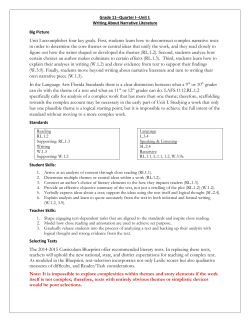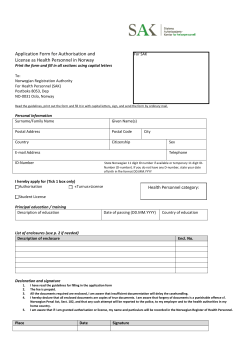
How to pass Norskprøve 2 / Norskprøve 3
How to pass Norskprøve 2 / Norskprøve 3 This guide will help you if you are preparing for the exam „Norskprøve 2“ or „Norskprøve 3“. It is based on students’ experiences while studying at Skapago for this exam. How well must you speak Norwegian? To pass Norskprøve 2 you should be at an A2 level, according to the Common European Framework of Reference for Languages. To pass Norskprøve 3 you should be at a B1 level, according to the Common European Framework of Reference for Languages. What does that mean? Norskprøve 2 will test your ability to use Norwegian on a basic level, i.e. that you can understand and use common words and expressions in familiar everyday situations. This means that you should be able to read short, simple texts and messages. You should also be able to talk about yourself and your family, your job, your education, your living situation and other familiar everyday topics using simple phrases and sentences. Norskprøve 3 will test your ability to use Norwegian independently, i.e. that you understand clear text and speech and are able to make yourself understood both when speaking and writing. This means that you must be able to understand the main points of a conversation in Norwegian. You should be able to deal with most everyday situations without any major problems and be able to understand the main points in radio and TV programs, for example the news. Additionally, you should be able to write a short, connected text on a topic of interest, or describing personal experiences and impressions. What can this guide help you with? The intention of this guide is not to go into great detail about how well you speak the language – for this, we recommend that you get your language level tested, for instance in a free trial lesson with one of our teachers. However, in this guide we want to explain what some of the main difficulties in the written test are and give you advice on how to best prepare for it. Both Norskprøve 2 and Norskprøve 3 consist of two parts each – a written test and an oral test. Both parts can be taken independently from one another. Before registering for the exam, make sure that you really need to take both tests (ask your employer, for example). This guide deals with the written test only. Listening test Norskprøve 2 The listening test measures your ability to understand simple information about familiar topics and grasp the main points in short, simple messages and announcements using simple language and clear enunciation. The listening test consists of up to 22 short conversations and messages that are immediately relevant or about familiar topics such as personal relationships, work, shopping, transport, home, the immediate environment etc. Each listening text is played twice. You must show that you can understand the main points and some details in clear, simple messages and announcements and that you can identify the topic of a conversation. Norskprøve 3 Each listening text is followed by a written question. The question is read aloud on the CD before the listening text. Some questions are multiple choice and some are short answers. The listening test measures your ability to understand main points and details in clear, moderated speech on familiar topics, as well as main points and details in shorter recordings. The listening test consists of 25 to 30 short conversations and messages about familiar topics such as work, school, home, leisure and free time. Each listening text is played twice. You must show that you can understand the main points and specific details in spoken texts on familiar topics and current events when the language used is clear and moderated. Each listening text is followed by a written question. Some questions are multiple choice and some are short answers. ✓ This is how you should respond: Before you listen to the messages, you will have time to read through the questions. It is very important that you read through the questions beforehand! Ask yourself: What kind of information do I need? What is the message or conversation about? This way you will know what to listen for when the message is played. For multiple choice questions, read the answer alternatives too. They can often give you a hint as to what you need to be listening for. You don’t need to write full sentences for the short answer questions, a few words are enough as long as you answer the question. Reading test Norskprøve 2 The reading test measures your ability to read and understand main points and some specific information in very short texts. Norskprøve 3 The reading test measures your ability to understand main points and find specific information in texts on familiar topics when the language is clear and direct and the content well-structured. The reading test consists of several shorter and longer reading texts such as advertisements, brochures, announcements, menus, user manuals, timetables or other simple written material such as personal letters, short newspaper articles or short factual texts. You must show that you can understand the main message and some details in the texts. The reading test consists of several shorter and longer reading texts such as personal and public letters, brochures, announcements, newspaper articles, literary texts and factual texts. You must show that you can understand the main message and specific information in the texts. Each reading test is followed by a few written questions. Some questions are multiple choice and some are short answers. Each reading test is followed by a few written questions. Some questions are multiple choice and some are short answers. ✓ This is how you should respond: Read through the questions before the main text so you know what information you are looking for. Then read through the entire text. Now you probably have an idea about where in the text you can find the answers. Do not answer the questions before you have read the entire text – you need to understand the main points as well as the details. The order of the questions often corresponds with the text, i.e. you can normally find the answer to the last question towards the end of the text. For multiple choice questions, read the answer alternatives too. They can often give you a hint what kind of information you need to find in the text. You do not need to write full sentences for the short answer questions, a few words or a short sentence can be enough, as long as you answer the question. Make sure you only answer the question – do not write down lots of things hoping that the answer will be somewhere in what you have written. Also, never give your own opinion or analysis when you answer the questions. You have to be completely objective. Only information you find in the text is relevant. Writing test Norskprøve 2 The writing test measures your ability to write very short, simple texts about the most important topics of everyday life. In this part of the exam you do not have to be objective – you are asked to express your opinion. Norskprøve 3 - first task: The writing test measures your ability to write simple coherent texts on familiar topics and topics of personal interest. In this part of the exam you do not have to be objective – you are asked to express your opinion. The writing test consists of two tasks. In the first task, you are asked to write a short note or message. In the second task, you must write a short story, a description, a personal letter or similar. The writing test consists of two tasks. In the first task, you are asked for your point of view on a given topic. Normally, you are also asked to state your reasoning and/or explain. ✓ This is how you should respond: Read through the question thoroughly. Make sure you understand the question and what you are asked to do. Before you start writing, think about what you want to write. How are you going to answer the question? Does the question give you any additional information you can use? When you have finished writing, remember to read through your text again to look for mistakes. Have you conjugated verbs, nouns and adjectives correctly? Is your sentence structure correct? Try to look for the mistakes that you often make, and correct them if you find any. Norskprøve 3 - second task: Here you must write a narrative, i.e. a slightly longer coherent text on a given topic. ✓ This is how you should respond: You will get two alternatives – choose the topic you know the best. Read through the question and make sure you understand it completely. Before you start writing, think about what you want to write and write down your thoughts. What are you asked to do? How are you going to answer the question? Go through your ideas and choose the ideas which are the most relevant. Don’t choose too many different topics: you have a word limit. Try to put your ideas in order. How do you want to start and finish your text? Remember to put in paragraphs. When you have finished writing, it is very important that you read through your text again to look for mistakes. Have you conjugated verbs, nouns and adjectives correctly? Is your sentence structure correct? Try to look for the mistakes that you often make, and correct them if you find any. How can Skapago help you? We provide individual live online lessons with the aid of Skype and virtual classroom. You do not have to share your time with other students, your teacher is fully focused on you and your goals. This form of teaching is as effective as a private teacher coming to your home. Our instructors have a lot of experience with Norskprøve 2 and 3 and will tailor a Norwegian course just for you. Please find more information about our individual Norwegian courses here. Do not hesitate to schedule a free demo lesson today! Skapago makes no guarantees, expressed or implied, as to the ownership, accuracy, or adequacy of the content of this guide. The guide is based on our experiences and does not contain any official advice - unfortunately we cannot guarantee that you will pass the exam even if you follow our advice. You are free to copy this guide as long as you do not change the content or delete Skapago‘s logo. If published on the web, you must put a link to www.skapago.eu For any questions, please contact us: info@skapago.eu Good luck with your exam!
© Copyright 2025





















